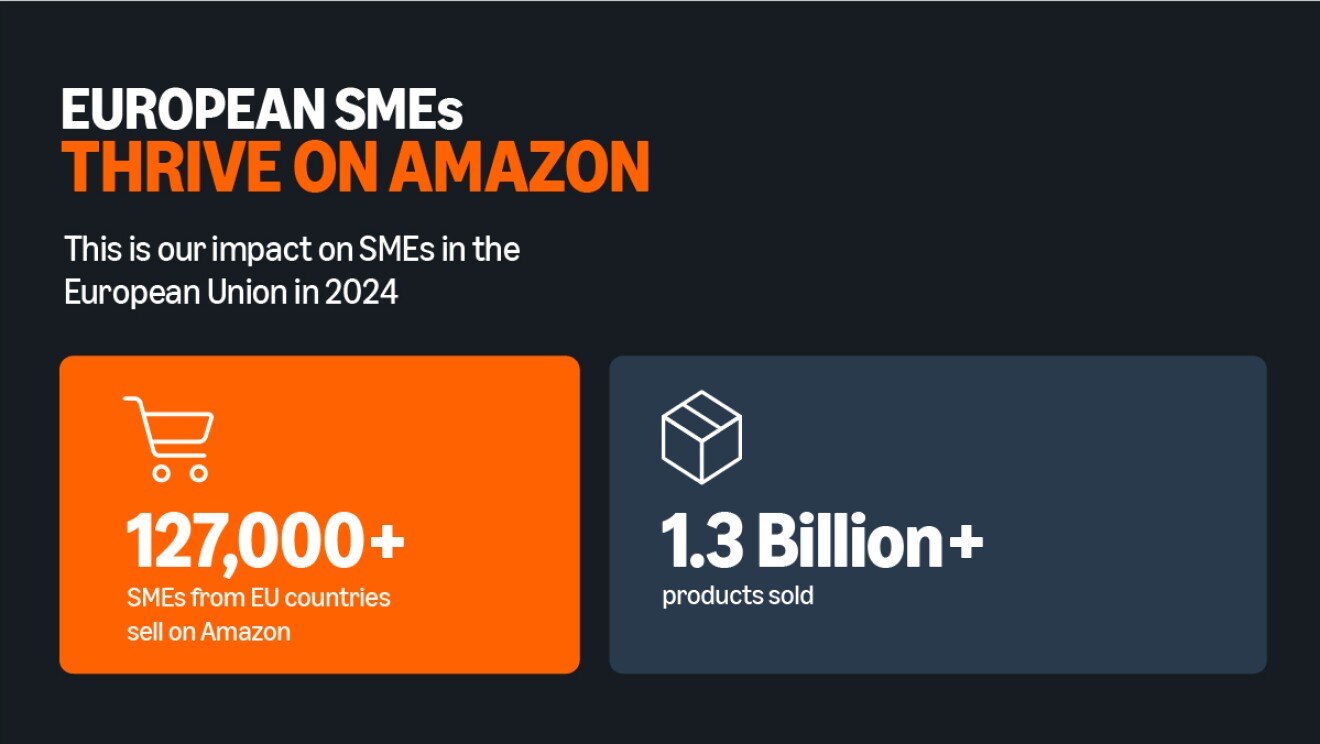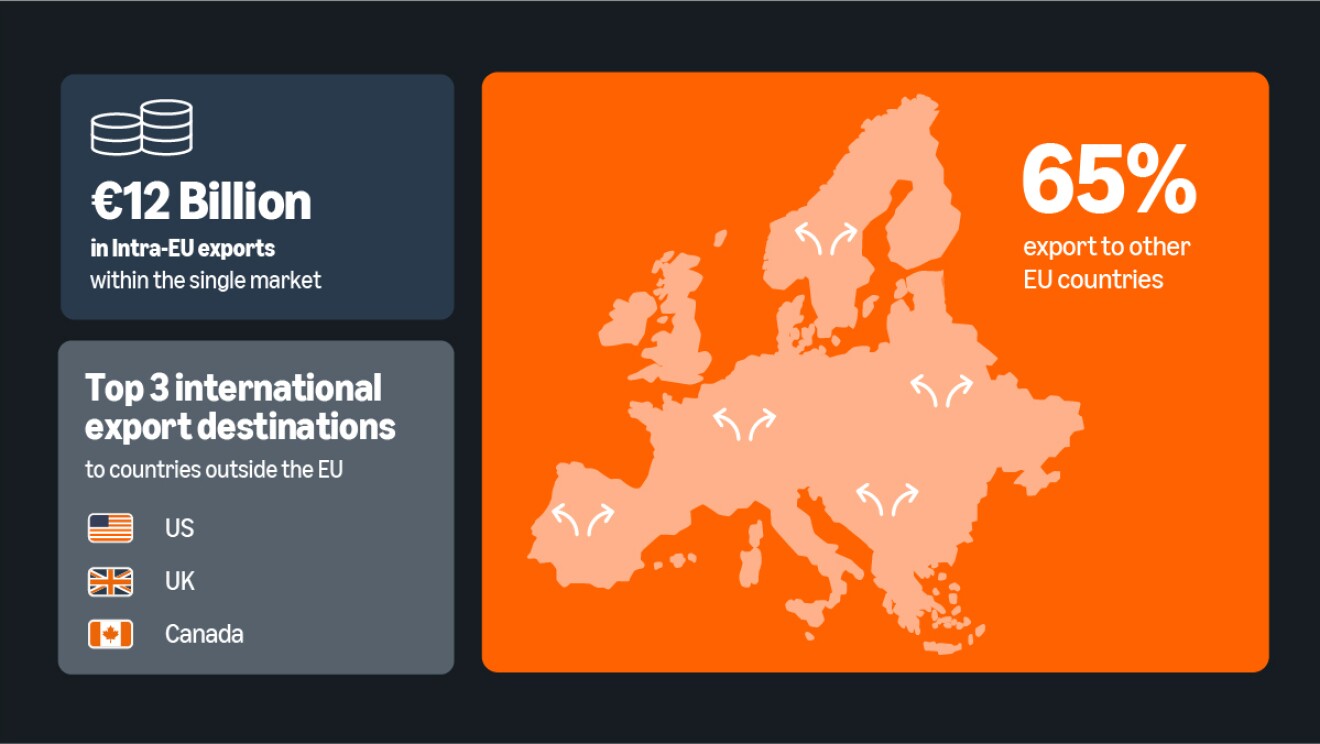When Swedish firm Steamery started its journey with Amazon, it was a small business with €180,000 in revenue. Today, this specialist in modern fabric care products designed to extend the life of clothing has expanded its sales to seven countries and grown its annual revenue to €1.3 million, an impressive 622% increase. This is just one example of the transformative power of digital commerce for European small businesses.
Steamery is one of more than 127,000 EU-based small and medium-sized enterprises (SMEs) that chose Amazon as their partner to reach customers in more than 230 countries and territories worldwide. In 2024, EU-based SMEs sold more than 1.3 billion products on Amazon, averaging 2,500 products sold every minute.
Breaking down borders
Amazon's support in understanding and managing local regulations and providing AI tools designed to break down barriers - such as the automatic translation of listings - allows SMEs to overcome many complexities of international sales, and to focus on the specific needs of customers in different countries.
The numbers tell a compelling story of European businesses leveraging Amazon’s infrastructure to streamline cross-border sales, logistics, and customer engagement.
- Over 100,000 EU SMEs exported to customers in 2024. This means that more than 80% of the 127,000 EU-based sellers selling on Amazon are reaching buyers outside their home country.
- These businesses generated more than €15 billion in export sales in 2024, an increase of €1 billion from the previous year.
“For many SMEs like us, online commerce has been the key to our growth,” said Marga López, co-founder of AEIOUBaby, a Spanish firm specialising in toys for positive education. “We all share the challenge of growing our businesses in an increasingly competitive digital environment and the goal of building a more favourable environment for SMEs selling online in Europe.”
“E-commerce is a key enabler for SMEs to grow, increase their efficiency, and access new markets,” said César Tello, Director General of the association of digital economy Adigital. “For them to unlock their full potential, it is essential to have a simplified regulatory framework that is harmonised and aligned with the realities faced by small and medium-sized enterprises. We must progress towards a true Digital Single Market in the EU, one without fragmentation that facilitates cross-border operations, while developing public policies that incentivise this type of commerce and drive SMEs’ growth and internationalisation."
“One of the biggest policy barriers we've been facing is the handling of VAT reporting for all countries,” said Raphael Matzker, CEO at the Swedish SME Steamery. “The VAT contains different rates depending on products and countries, which require both time and resources for handling. The same applies to recycling regulations like Extended Producer Responsibility (EPR), which quickly gets time consuming as well when selling to multiple countries. Amazon has really streamlined this process for us and made it a lot easier.”
This content is hosted by a third party (www.youtube.com).
To view the content, you need to consent to cookies by selecting Accept all in the popup banner. Or you can go to the site footer, select Cookie Preferences, and then select On under Functional Cookies, Performance Cookies and Advertising Cookies.
Strengthening the EU Single Market
The European Single Market remains a crucial driver of growth: four out of the top five export destinations for EU SMEs selling on Amazon are other EU member states.
- Most trade of EU SMEs remains within the EU Single Market: intra-EU exports by SMEs exceeded €12 billion.
- The top three international export destinations (to countries outside the European Union) are: United States (€2 billion+), UK (€900 million+), and Canada (€100 million+).
“We are fully committed to helping European SMEs succeed across Europe,” said David Zapolsky, Chief Global Affairs & Legal Officer at Amazon, during a recent trip to Brussels, Belgium, and Stockholm, Sweden, to visit with sellers. “I'm incredibly proud of our role as a champion for the Single Market. We're making it easier for businesses to reach millions of customers across the EU.”
This content is hosted by a third party (www.youtube.com).
To view the content, you need to consent to cookies by selecting Accept all in the popup banner. Or you can go to the site footer, select Cookie Preferences, and then select On under Functional Cookies, Performance Cookies and Advertising Cookies.
Belgian SME Garzini – which sells wallets and card holders - is another success story of a small business’ internationalisation. “We started focusing on Amazon in 2020, and our business has doubled each year since then,” said Christophe de Smet, founder of Garzini. “Before that, online sales made up just 30% of our revenue. Today, it's 70%. Amazon has really helped us scale our international sales.”
Empowering rural communities
For many small and medium-sized enterprises based outside major urban centres, digital commerce has become a game-changer, breaking down geographical barriers and enabling them to compete on an international scale:
- Nearly half (45%) of EU SMEs selling on Amazon operate from less densely populated or rural areas.
- More than 45,000 sellers from these regions use Amazon to reach customers.
- Sellers in rural and less densely populated areas generated over €6 billion in export sales in 2024.
Eva Rytter Sunesen, Partner at Implement Economics, said: "Amazon's latest figures, showing over 127,000 European SMEs generating €15 billion in export sales, with €12 billion in intra-EU trade, demonstrate the EU Single Market's potential when digital tools address trade barriers. Particularly significant is that 45% of sellers operate from rural and less densely populated areas, illustrating how e-commerce can level the playing field. As exemplified by Steamery's experience and confirmed by our recent research, regulatory complexities like VAT reporting and EPR requirements remain significant hurdles for small businesses. Harmonising these regulations and leveraging digital solutions could further unlock the Single Market's potential, especially for SMEs in less urban areas."
Looking ahead, Amazon remains committed to supporting European SMEs as they continue to grow, innovate, and create jobs across the EU. We continue to invest in the tools, training, and infrastructure that help businesses of all sizes succeed in the digital economy.
















